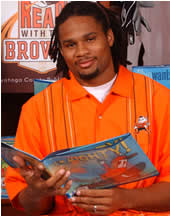
Josh Cribbs still wants a chance to prove himself as a returner.
Placekickers just had their best week ever. Kick returners? Not so much.
Fans and players alike were looking for a break from the lockout talk and the NFL just gave it to them in the form of the latest rule changes. The NFL announced this week that kickoff will now take place at the 30 yard line instead of the 35 yard line. Touchbacks will remain at the 20 and coverage teams will get a 5 yard head start instead of a 10-15 yard head start.
What does this mean?
Less returns
Less injuries on returns
Less excitement
More touchbacks
Less excitement
Last season, with kickoffs taking place at the 30 yard line, there were 23 kickoff returns that resulted in a touchdown. The last time teams kicked off from the 35 yard line was 1993. That year there were four such returns.
I can’t boo loud enough!
Kickoff returns are one of my favorite parts of football. There’s just nothing like a an exciting return, especially to start a game. I’ve heard a lot of theories about why 26 teams would vote in favor of the rule change-everything from having to avoid paying returners to setting the stage for an 18 game season. All valid. But I think that the owners heard the phrase “prevent injuries” and knew they could go for it both for financial reasons as well as to appear sensitive to the safety issue-especially since they voted down increased protection for defenseless receivers at the same meeting (SIDE FUCKING EYE!).
If you are a regular reader of my blog you know that I support anything that keeps the fellas on the field safer. But I really hate when practices are eliminated through the backdoor. In this case, the NFL isn’t really reducing injuries through modification, they’re doing so through elimination. If the NFL wants to get rid of kickoff returns they should just do it rather than pretending there’s still a real choice for coaches and players.
Even the reduced lead time for coverage isn’t going to help returners enough to prevent their inevitable drift into never never land. One day I will tell my grandchildren about the spectacular kickoff returns I’ve seen. By then I’ll probably also have to explain to them that there used to be punt returns, sacks, and tackles too.
I’m exaggerating…slightly.
But I really am uncomfortable with the way that the rule changes that happen every year send different messages about the game’s direction. Perhaps as soon as we’re done discussing the CBA there should be a general conversation about the future of the game.If kick off returns are so dangerous, is it possible that they may eliminate punt returns next? PLEASE GOD NO! Hi Roger! Let’s chat about this. Call me.
Seriously though, some teams have invested in their special teams (the Browns being one example as well as the Bears who both voted against the rule) and if we’re going to talk about finances, it might be good for owners to talk about where the game is going before making rules that negate investments some of them have already made. Part of being a good business owner is planning. ZING!
On another note, it bothers me that the NFL refused to release any data on this issue. Football players are injured on any time play action takes place. I couldn’t begin to take a guess about whether kick off returners are being injured more often on returns than in other times they’re on the field.
The most notable return injuries last season weren’t a result of velocity rather awkward tackling and illegal hits such as what happened to Dez Bryant and Ellis Hobbs. Kick off return injuries are also more memorable than other types of injuries and without data, how do we know the NFL isn’t scapegoating?
That being said, many injuries on kickoff happen to other players-not the returners. And even without numbers you can assume that there’s a health benefit to the rule change (reduce contact, reduce injury, 2+2 = 4 and other complicated things of that nature).
Predictably, kickers around the league went to bed while visions of touchbacks danced in their heads.
Graham Gano:
“On kickoffs you do see a lot of big plays, a lot of big hits, and a lot of big touchdowns. I think it will affect that a whole lot. You’re gonna see guys who don’t have a strong leg putting it in the end zone, getting touchbacks, so that’s going to take away chances to get big returns. For us I think it’s going to help us out a lot.”
Jay Feely
“Personally, I’m very happy about it. I think all the veteran kickers are happy about it. I do think it will definitely take some excitement out of the game. It eliminates good returns from guys like LaRod (Stephens-Howling), Devin Hester, Leon Washington.”
Speaking of Hester and Washington, they had plenty to say, so did Josh Cribbs.
Devin Hester
“They’ve gone too far. They’re taking the whole fun out of the game,” Hester said. “The fans come out, especially in Chicago, to see returns. That’s one of our key assets to our team. Fans love our big returns. Not only do they kick it out of bounds when it’s time to punt the ball. But now they get this advantage on kickoffs where we felt we were guaranteed a kickoff return. Now you’re taking that away from our return game. The return game is out of the picture.”
Leon Washington
Oh they hating on me man. Come on now. You know I don’t like the rule. I’m sure sure Brad Smith and Devin Hester and Joshua Cribbs and the rest of those guys you know doing a good job returning the balls don’t like the rule. I mean it’s a part of the game that is really exciting. I think fans look forward to it because it’s an instant momentum change. You gotta think about it. It’s the first play of the game or the first play after halftime after the opposing teams scores, so it’s one of those things. I think the NFL is trying to figure out how can they minimize the injuries on the kickoff and kickoff return unit. Also like you said there might be some greed involved. I’m sure teams will try to adjust to it. I was telling my dad the other day you know it looks like there’s going to be a bunch of 109-yard kickoff returns because I plan on coming out of the end zone if that takes place.”
Josh Cribbs
“It’ll be a tremendous amount of touchbacks…They’re already kicking away from Devin Hester, myself, other guys and this will just make it over the top, like no kickoff returns.
“I guess I just have to get my punt game up until they change that. I just can’t fathom that other alternatives were not taken. What it does do is take a lot of the excitement out of the game, decreases the opportunity for guys like myself coming out of college to have an opportunity to play football because scouts won’t recruit guys like that anymore because they won’t need them.”
Just so you know, the Eagles, Browns, Jaguars, Bengals, Raiders, and Bears were the only teams to vote against the rule change.
 Oh this is just so wrong. So wrong. And so wonderful.
Oh this is just so wrong. So wrong. And so wonderful.







